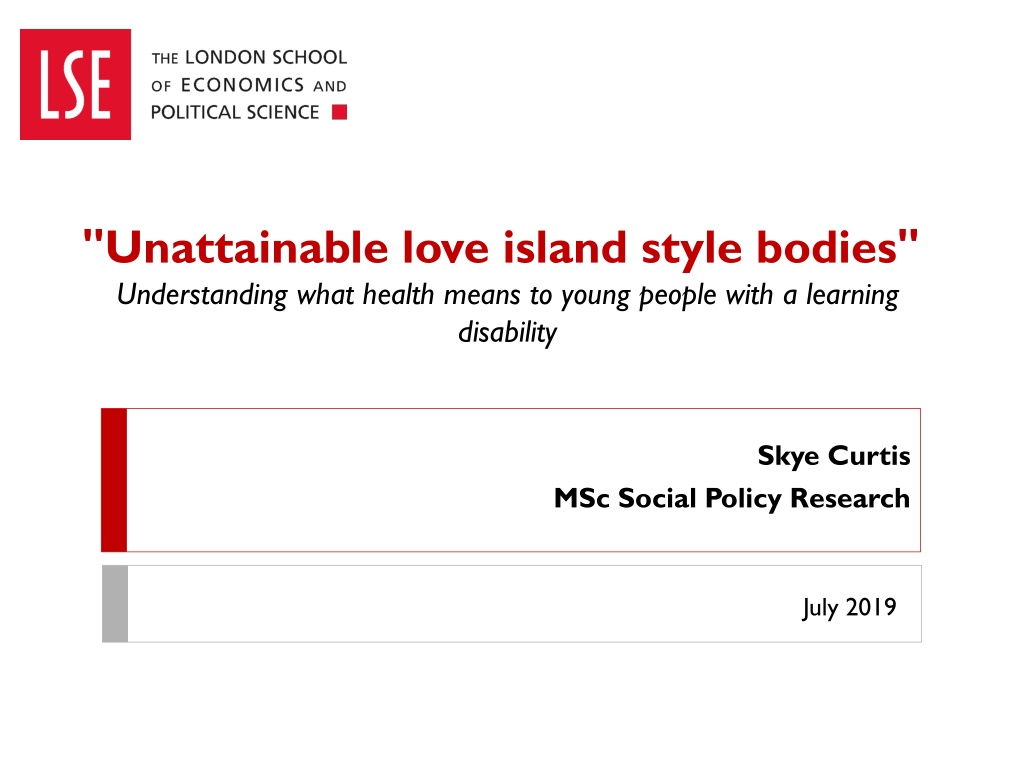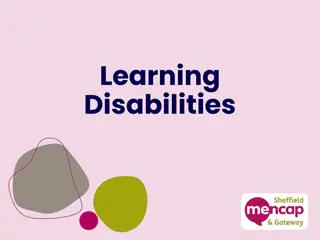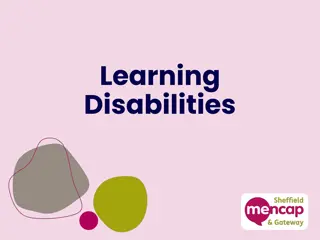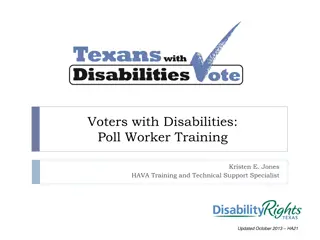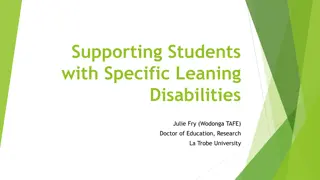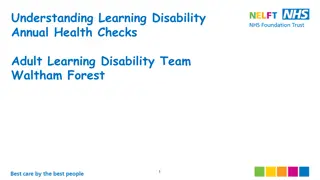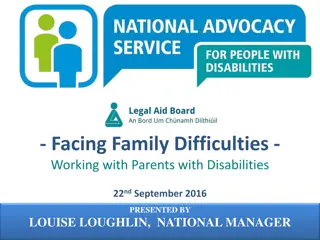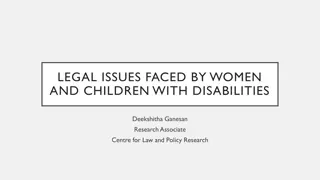Understanding Health Perceptions of Young People with Learning Disabilities
This research delves into how young individuals with learning disabilities perceive health, exploring the concepts of physical, mental well-being, and the impact of socio-economic factors on health outcomes. Through interviews and focus groups, the study reveals diverse perspectives on health behaviors and understandings among this demographic, shedding light on the importance of inclusive health discourse.
Download Presentation

Please find below an Image/Link to download the presentation.
The content on the website is provided AS IS for your information and personal use only. It may not be sold, licensed, or shared on other websites without obtaining consent from the author. Download presentation by click this link. If you encounter any issues during the download, it is possible that the publisher has removed the file from their server.
E N D
Presentation Transcript
"Unattainable love island style bodies" Understanding what health means to young people with a learning disability Skye Curtis MSc Social Policy Research July 2019
Health Inequality People with a learning disability have worse physical and mental health compared to people without a learning disability. 2
The importance of socio-economic factors Socio-economic factors can contribute to the primary barriers preventing people with learning disabilities from being able to live a healthy lifestyle. Controlling for socio-economic factors and opportunities for social participation in the community, significantly reduces the difference in health outcomes and risk factors between people with learning disabilities and the general population. People with learning disabilities face an increased likelihood of stigmatisation, discrimination and poor mental health. Ref: Heslop et al. 2013; Tuffrey-Wijnes, Giatras, Goulding, Abraham, Fenwick, 2013; Allerton and Emerson 2012; Messent, Cooke & Long 1999; Hatton, 2016. 3
Determinants of health The Main Determinants of Health (Adapted from Dahlgren & Whitehead, 1991) 4
This research aimed to explore How young people with learning disabilities conceptualise health And How this conceptualisation of health relates to their health behaviours Approach Data collection: Interviews with 15 young people who have learning disabilities 2 focus groups Use of prompts, vignettes, images, videos to allow for multiple avenues of communication Data analysis strategy Thematic analysis (deductive and inductive) 5
What does health mean? Health as a practice, something you do Health as something you eat participants listed multiple healthy and unhealthy food types. Someone who observes the eat well plate. That s what a healthy person is. - Tom Health as something you do participants talked about exercise, but they were less specific about what this entailed. Health as the way you look participants described healthy people as skinny and muscular and like "unattainable Love Island style bodies . Mental health - most participants didn't initially think about mental health, and they found it hard to articulate what it is. Descriptions of mental health focused on autonomy and 'freedom'. "six pack, muscles [pause], and speed." - James "I m healthy because I look healthy and i m good looking" - Daniel Mental health is about being free, being able to do what you want and feel happy James 6
Health Behaviours Understanding what a healthy behaviour looks like doesn t necessarily lead to healthy behaviours "...my mum normally makes chicken, like some wings with, I don t know, it s not really...because it s home cooked it doesn t have a lot of fat so it makes it different.But,if I eat outside, yeah it has a lot of fat." - Zahara 7
Barriers to healthiness People drink because it makes them forget everything, and makes them have fun. - Daniel Barriers to health Price mainly. The cheaper one is always going to be unhealthy and the most expensive one is always going to be healthy. My families on a budget. Tom Stress Money Social / peer pressure It all started because my nan passed about 5 years ago. Uh it was stressful then. Daniel Fun / enjoyment I live in a hostel yeah, and a lot of people drink and smoke weed and stuff Abioye 8
Resistance Some participants resisted healthiness, they tended to participate in multiple, and acknowledged unhealthy behaviours. Are health behaviours aligned with general attitudes towards institutions, rules and norms? 9
Facilitators of healthiness I want to look fit. I want to feel good about myself, and I do it for me. Yeah, that s it. - Zahara Facilitator to health Self-determination/ Exercise makes me happy. I might wake up feeling a bit low, and then I exercise and work out an I feel refreshed. - Mohammed control Social/ Family influence Enjoyment I don t drink sugary drinks, it messes with your brain. I haven't experienced it, but I know from talking to teachers at school, and health professionals who does a lot of PE. - Tom 10
Exploring differences in behaviour Reaction Internalised React against ideals of 'healthiness' Supportive of 'healthiness', but do not always participate in it. Exercise is empowering, and helps the young person feel in control. Moments of stress encourages 'acting-out' and some unhealthy behaviours. Choose food based on enjoyment, taste, availability. Experienced stress and conflict. Change in health behaviour coincides with change in life. Attitudes to health align with attitudes to life more generally. Present bias 11
Emerging learnings o Messages - Clear, simple messages are easily understood and remembered.This supports awareness, but it doesn t necessarily lead to action. o Messenger - images of 'healthiness' are aligned with public health messages, but they are also aligned with images of health branded by popular culture, this can create a sense of healthiness becoming 'unattainable'. o Behaviours - Health behaviours may be associated with other social behaviours,and the best way to address them may be to better understand the source of 'reaction'. o Coping mechanisms food, smoking and drinking are sometimes used as coping mechanisms. At the same time, sport can be a positive mechanism, and it can help people feel in control. 12
